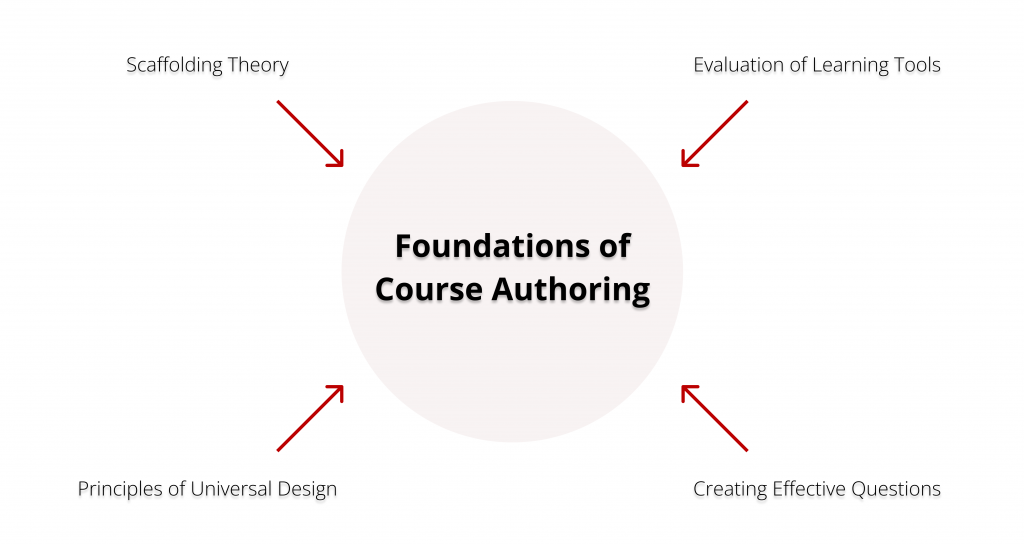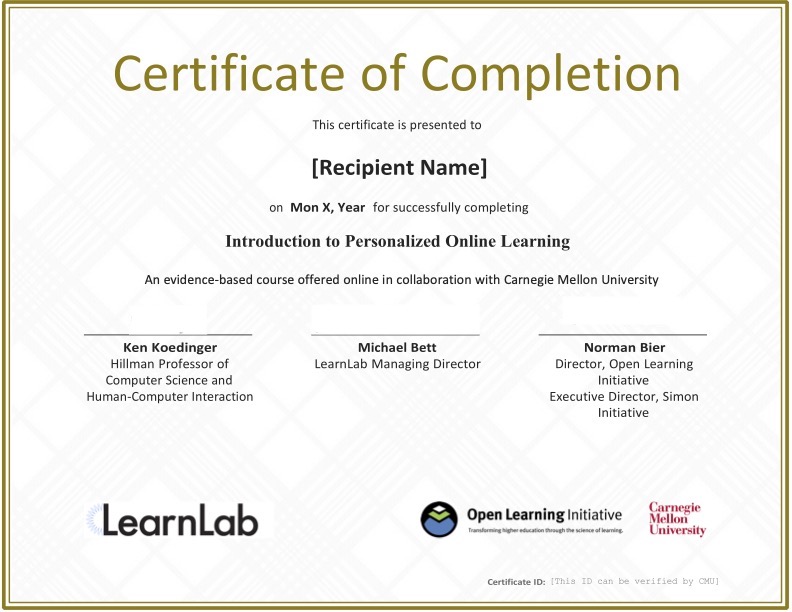Introduction to Course Authoring


Start Any Time
Work on your pace and you will have instructors available to help you answer any questions.

Duration
Approximately 6 weeks, 8-10 hours/week

Fee
$750 - Professional Rate
$300 - Full-time Student Rate*
Referral & Group Discounts Available**
*Proof of full time student enrollment required. Acceptable forms of ID include a letter from your university’s registrar office or an unofficial transcript. Email your documents to learnlab-help@lists.andrew.cmu.edu.
**Have you taken one of our courses before? Refer a friend or colleague and get 20% off any future course – they’ll get 20% off a course of their choosing, too! Just have the person you refer email us at learnlab-help@lists.andrew.cmu.edu with your name and email address. Contact us about group discounts.
Certificate Course Description:
Introduction to Course Authoring offers practical approaches to creating effective and inclusive learning environments. This course begins with an exploration of scaffolding theory, including Vygotsky’s zone of proximal development. You will also learn to evaluate educational technologies, develop effective questions in an online learning context, and align those questions with learning objectives. This course concludes with application of principles of universal design, introducing how to use these principles in a learning context. By the end of the course, you will be equipped with the skills for designing, evaluating, and implementing educational experiences.
Our team hosts office hours for all courses over Zoom on the 2nd and 4th Wednesday of each month, 10:00 AM – 11:00 AM EDT/EST (4:00 PM – 5:00 PM CAT). On 2nd Wednesdays, Dr. Ken Koedinger, who is the Director of the Masters of Educational Technology and Applied Learning Sciences (METALS) program, will be available. On 4th Wednesdays, you will have the opportunity to speak with our learning engineers.
Module 1: Scaffolding Theory
- Explain how learning occurs by specifying a model referencing zones of student ability
- Categorize learning tasks into their appropriate zone of ability
- Distinguish between the different mechanisms of scaffolding and fading
Mini-Project 1: Selecting a Tool
- Leverage artificial intelligence to improve edTech tools in terms of learner efficacy and/or ease of use
- Contrast the advantages and disadvantages of tools that use AI and tools that do not
- Explain the importance of integrating humans in the loop in edTech tools
Module 2: Properties of Learning Tools
- Explain why we need (a) method(s) of evaluating educational technologies
- Define the two SALT rubric foundational criteria (easy to use, participation)
- Define the four SALT rubric additional evaluation criteria (broadly available, equitable, flexible, suitable for active learning experiences)
- Distinguish between foundational and additional evaluation criteria
- Given an example scenario, identify whether a tool meets each criteria (easy to use, participation, broadly available, equitable, flexible, suitable for active learning activities)
Mini-Project 2: H5P
- Evaluate how to promote student learning with the affordances of a specific edTech tool
- Create engaging, effective learning experiences using H5P
- Create branching scenarios using H5P
Module 3: Course Authoring Fundamentals
- Name the characteristics of an effective question
- Evaluate a given question to determine whether it is effective
- Define each type of question (exploratory, clarification, extension, prediction, rationalization, relational, hypothetical, rhetorical, summary)
- Categorize a given question by type
- Given an example learning objective, identify which question type(s) would be appropriate
Mini-Project 3: DSPy
- Utilize DSPy to program foundation models with minimal code to solve a provided task
- Curate datasets
- Contrast the advantages and disadvantages of using end-user tools (ChatGPT) vs. DSPy (Jupyter Notebook)
- Define metrics for quality evaluation
Module 4: Universal Design of Learning
- Define universal design
- Name the 8 steps of the process of universal design (identify the application, define the universe, involve consumers/learners, adopt guidelines or standards, apply guidelines or standards, plan for accommodations, train and support, evaluate)
- Name 7 principles of universal design (equitable use, flexibility in use, simple & intuitive, perceptible information, tolerance for error, low physical effort, size and space for approach and use)
- Given an example tool design scenario, identify steps to take to ensure the tool effectively implements principles of universal design
- Given an example scenario & tool, identify existing features of that tool that successfully implement principles of universal design
- Given an example scenario & tool, make recommendations that could improve implementation of principles of universal design
Module 5: Course Project
At the end of the course, you’ll have an opportunity to build a project using an EdTech tool of your choosing. You’ll then evaluate your own project using the SALT rubric and principles of universal design. The project will be graded by the instructor and you will receive personalized feedback along with a sample solution.
None, though some experience creating learning objectives will be helpful.
Researchers, product/UX designers, instructional designers, and anyone interested in edTech.
What you'll learn
By the end of this course, you will be able to:
- Identify zones of student ability, categorize tasks by student ability, and support student learning through scaffolding and fading
- Evaluate educational technologies using the SALT rubric
- Create effective questions and align question types with learning objectives
- Define and apply universal design principles in an educational settings
Course Instructors

Dr. Steven Moore
I am a postdoctoral researcher at the Human-Computer Interaction Institute in the School of Computer Science at Carnegie Mellon University, advised by Dr. Ken Koedinger. My work combines expertise in learning science, computer science, and applied natural language processing to create and evaluate educational content for online learning platforms. I developed SAQUET, the Scalable Automatic Question Usability Evaluation Toolkit, an open-source to improve the assessment of educational materials. Recently, my research has focused on leveraging LLMs to support instructional design, such as applying rubrics to different content types. In 2023, I won the XPrize Digital Learning Challenge for our project on adaptive educational experimentation. My contributions have led to advances in learnersourcing, educational crowdsourcing, and human-AI collaboration. I am also passionate about teaching, having redesigned and taught several courses at Carnegie Mellon and other institutions.
You can find out more at StevenJamesMoore.com.
Certificate
Upon successful completion of the program, participants will receive a verified digital certificate of completion from Carnegie Mellon University’s Open Learning Initiative.

In addition to the knowledge and immediately applicable frameworks you will gain by attending your selected courses, you will benefit from:
- A digital, verified version of your Executive Certificate (Smart Certificate) you can add to your resume and LinkedIn
- Networking with a global group of your peers and instructors for advancing your career
Register Now
Register and start taking the course in three steps:
1. Enter your name and email address
2. Create your account here to access our learning platform.
Have questions? Our learning engineers are here to answer them at our monthly live AMA events! Join us at 4 PM EST on First Fridays, or 10 AM EST on Third Mondays. Registration required.